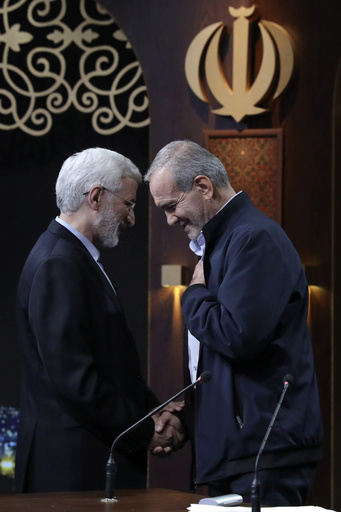TEHRAN, Iran (AP) — Iran’s presidential candidates on Monday accused each other of having no solution for the country’s problems ahead of Friday’s runoff election aimed at choosing a successor for the late President Ebrahim Raisi, who died last month in a helicopter crash.
During a more than two-hour debate on public TV, reformist candidate Masoud Pezeshkian attacked his competitor, Saeed Jalili, a hard-line former nuclear negotiator, for his lack of experience, saying: “Tell me, what single company have you ever managed to make you capable of running the country?
Jalili, who is known as the “Living Martyr” after losing a leg in the 1980s Iran-Iraq war and is famous among Western diplomats for his haranguing lectures and hard-line stances, defended himself highlighting his career and several positions held, including that of top nuclear negotiator.
Pezeshkian further questioned his opponent on what plans he would have for reaching a nuclear deal, with Jalili responding he would approach it “based on strength not weakness,” without providing details.
Jalili accused Pezeshkian of having no plans for managing the country, saying his presidency would drive the country to a “backward position,” as it was under relatively moderate former President Hassan Rouhani (2013-2021). Rouhani struck a nuclear deal with world powers that capped Iran’s uranium enrichment in return to lifting sanctions but later, in 2018, President Trump pulled the U.S. out from the landmark deal abruptly restoring harsh sanctions on Iran.
Jalili said that “with the support of people,” Iran would achieve an economic growth of 8% a year, a promise Pezeshkian mocked, saying authorities should be allowed to “execute him if he failed” to deliver on it.
Iran must implement “a dynamic foreign policy” if it wants to have a successful economy, Jalili said, adding that it should not be limited to those nations that it has a problem with — a reference to the U.S. and the western world. Instead, he said, “Iran should look to the other 200 nations in the world where “foreign relations should be improved.”
Pezeshkian said his foreign policy will be based on “engagement with the world” including engaging in “negotiations for lifting sanctions.”
Both sides promised to address the problems of the country’s poor, workers, women, ethnic groups and religious minorities, and vowed to provide better and faster internet — a plea to a younger generation that showed apathy during Friday’s vote.
Pezeshkian and Jalili also said the low turnout in the first round — the lowest-ever poll turnout in the Islamic Republic’s history — should be probed.
“It is not acceptable that some 60 percent (of voters) did not cast a ballot,” said Pezeshkian.
The candidates will face Tuesday in a second and last debate.
___
Follow the AP’s coverage of global elections at: https://apnews.com/hub/global-elections/
—
Rephrased content:
Iranian presidential candidates engaged in a heated debate on national TV, criticizing each other’s capabilities and proposed solutions for the country’s challenges leading up to the upcoming runoff election to choose a successor to the late President Ebrahim Raisi, who tragically passed away in a helicopter crash last month.
One of the candidates, Masoud Pezeshkian, targeted his opponent Saeed Jalili, a former nuclear negotiator known for his hard-line stances, questioning Jalili’s management experience and ability to lead the nation effectively.
Jalili defended himself by highlighting his career achievements and positions held, including his previous role as a top nuclear negotiator, earning him the nickname “Living Martyr” due to his sacrifices in the Iran-Iraq war.
The debate also delved into discussions about nuclear deals, economic growth projections, foreign policy strategies, and addressing the concerns of various segments of society such as the poor, workers, women, ethnic groups, and religious minorities.
Both candidates pledged to improve internet access, appealing to the younger population, which notably displayed apathy in the initial round of voting that recorded the lowest turnout in the history of the Islamic Republic.
As the runoff election approaches, the candidates are set for a final debate on Tuesday, with the issue of low voter turnout from the first round being a topic for further examination and discussion.
For more global election coverage, visit: https://apnews.com/hub/global-elections/




